This healthy hibiscus tea is made with dried hibiscus flowers, cinnamon, and honey for a delicious warm drink that will keep you warm on chilly days!
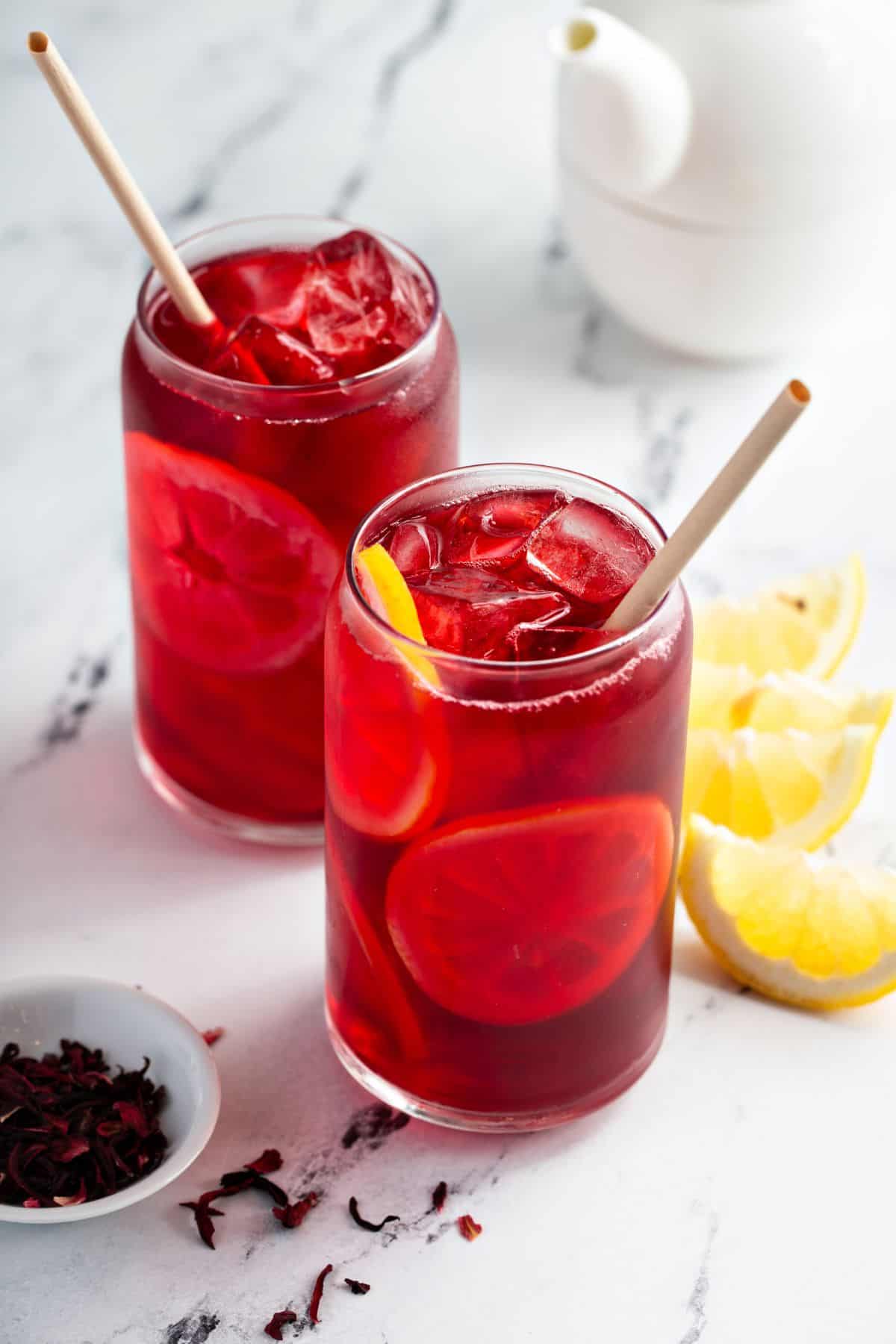
Table of Contents
Hibiscus Tea
Along with the arrival of Autumn come colds, congestion, seasonal allergies, and sleepiness, among other unpleasant effects.
Drinking teas may help relieve those symptoms while enjoying a comforting, warm beverage. With this in mind, I decided to share with you an easy and delicious recipe for a cranberry-like hibiscus tea.
All that you need is a few ingredients, a pot, and patience to infuse dried hibiscus flowers in boiling water.
In addition, I included a useful guide to medicinal teas.
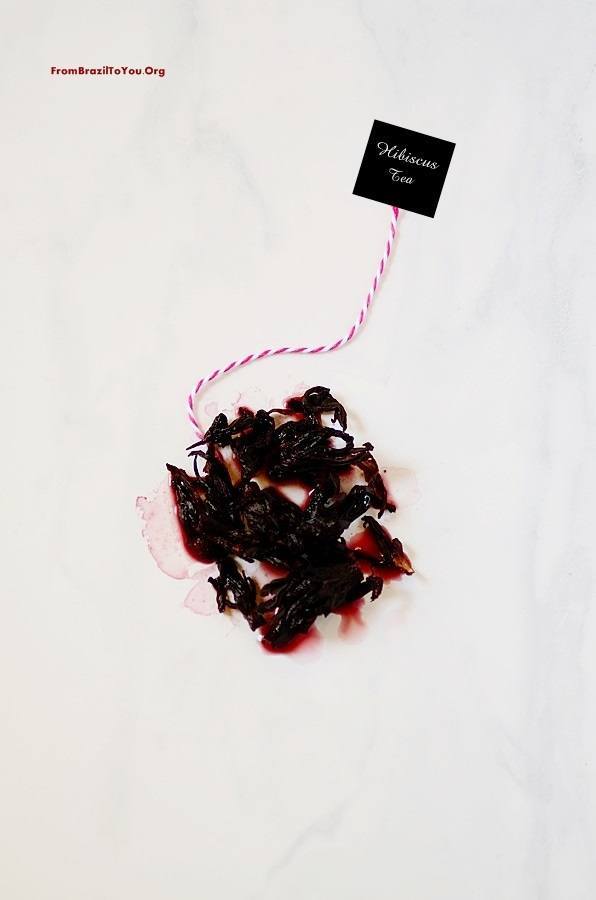
How to Make Hibiscus Tea
- Boil water in a pot!
- Add the dried hibiscus flowers and cinnamon stick (and orange peel if you want). Cover and let them steep for 15-20 minutes.
- Strain and stir in honey to taste. Then, serve warm with lemon slices. If you prefer yours iced, let your hibiscus tea cool and chill in the fridge. Serve with ice cubes.
TIP: Don't let your tea steep for longer than 20 minutes or it may become bitter.
Medicinal Teas
Brazilian tea culture has its origins in the infused beverages, or chás made by the indigenous cultures of the Amazon region. Most varieties of tea came from China and neighboring countries.
However, tea culture has evolved since the Portuguese colonial period to include imported ones from Japan, Sri Lanka, India, and elsewhere.
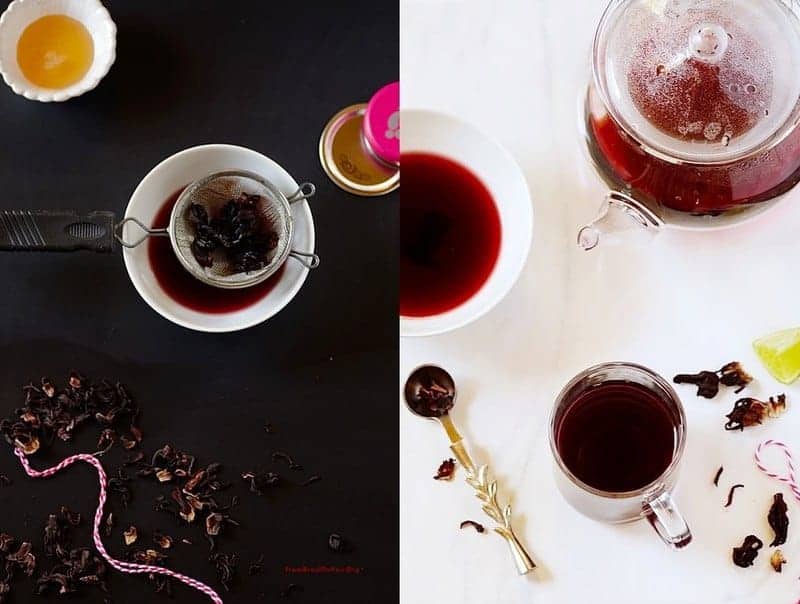
Among the many medicinal teas drank in Brazil (as well as other countries, including the United States) are these:
- HIBISCUS (hibiscus): an herbal infusion made from the dried crimson flower of the roselle or hibiscus flower. It can serve it either hot or cold. According to Healthline and other web sources, hibiscus tea is typically used for treating colds, upper respiratory tract pain, swelling (inflammation), fluid retention, stomach irritation, and disorders of circulation. Because it has gentle laxative and diuretic properties, it is potentially associated with weight loss. Dried hibiscus flowers, often labeled flor de Jamaica, have long been available in health food stores and Latin markets in the United States, especially in California and other areas influenced by Mexican customs. In local American grocery stores, hibiscus tea is available as "Red Zinger", popularized by the brand Celestial Seasonings. We share a great recipe for hibiscus tea here.
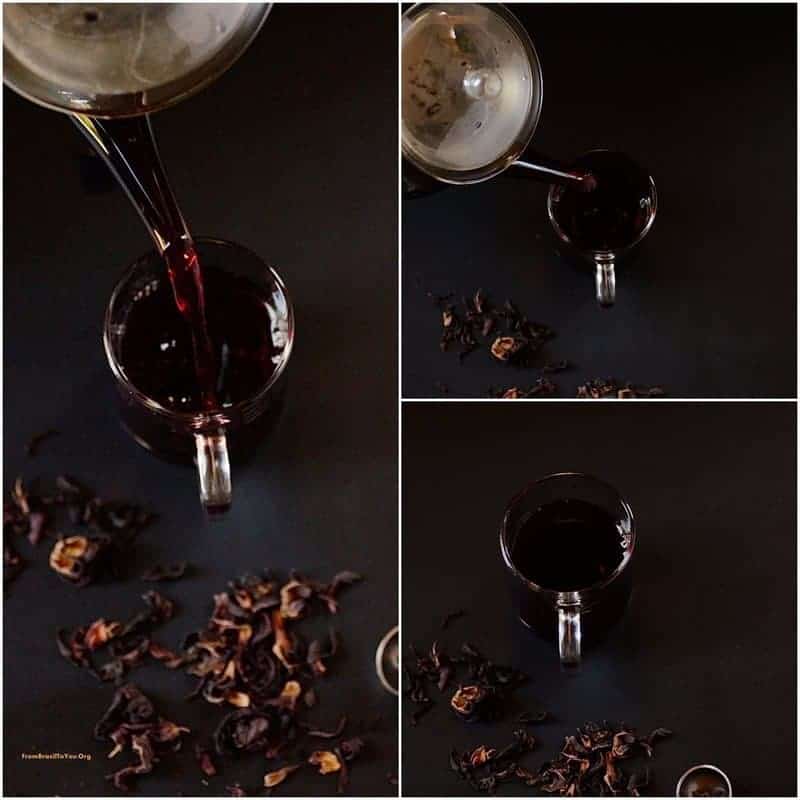
- YERBA MATE (erva-mate or chimarrão)
- LEMON VERBENA (Lúcia-Lima)
- LEMONGRASS (erva-cidreira)
- CHAMOMILE (camomila)
- BLACK TEA (chá preto)
- FENNEL (erva-doce)
- STAR ANISE (anis)
- BOLDUS, BOLDOA, or BOLDEA (Boldo)
- HORSETAIL (cavalinha)
As anything, drink herbal teas in moderation, according to their indication, and never use them as a replacement for prescribed medicines. This includes our easy hibiscus tea recipe!
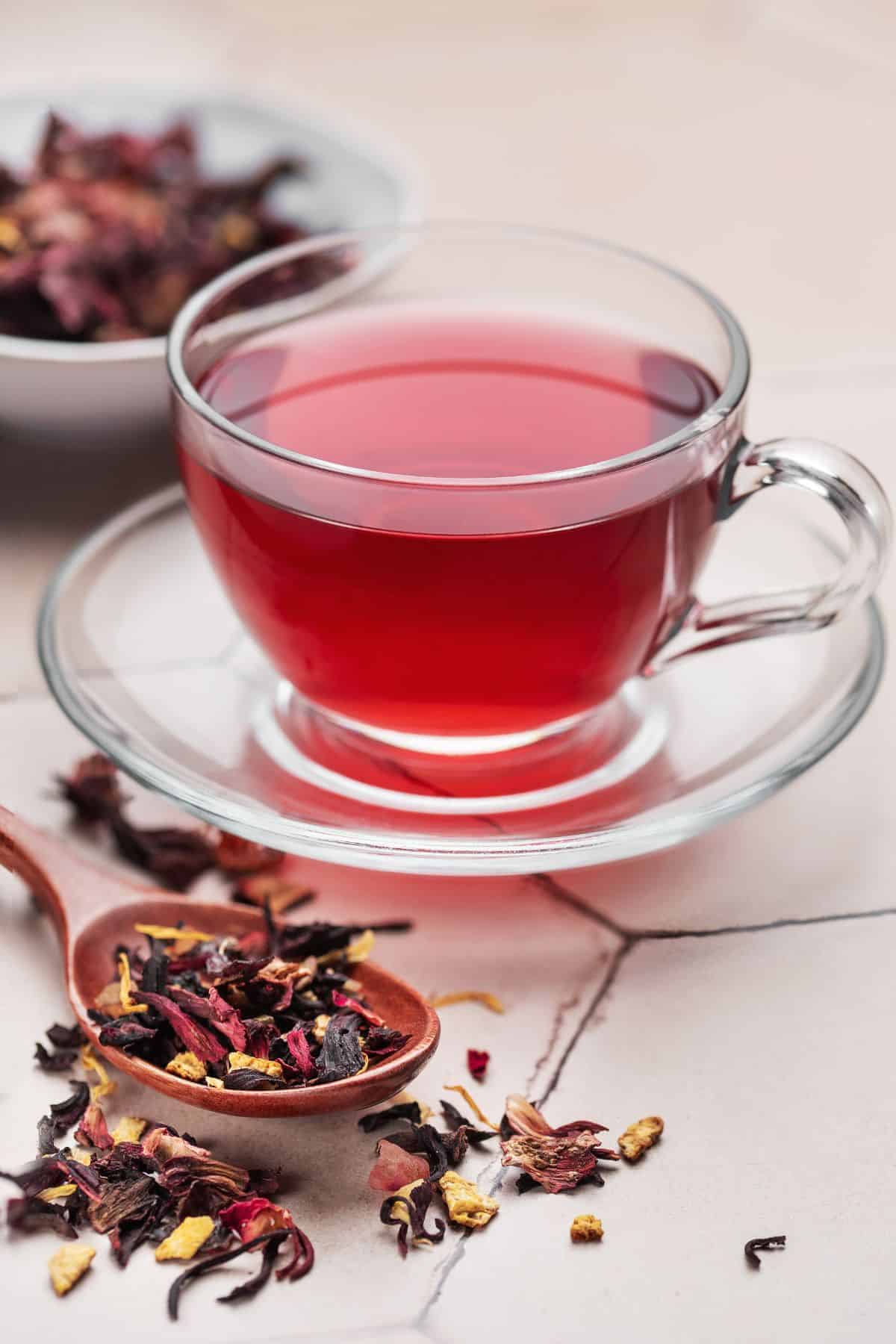
Other Healthy Beverages
Enjoy the season as well as these other healthy beverages:
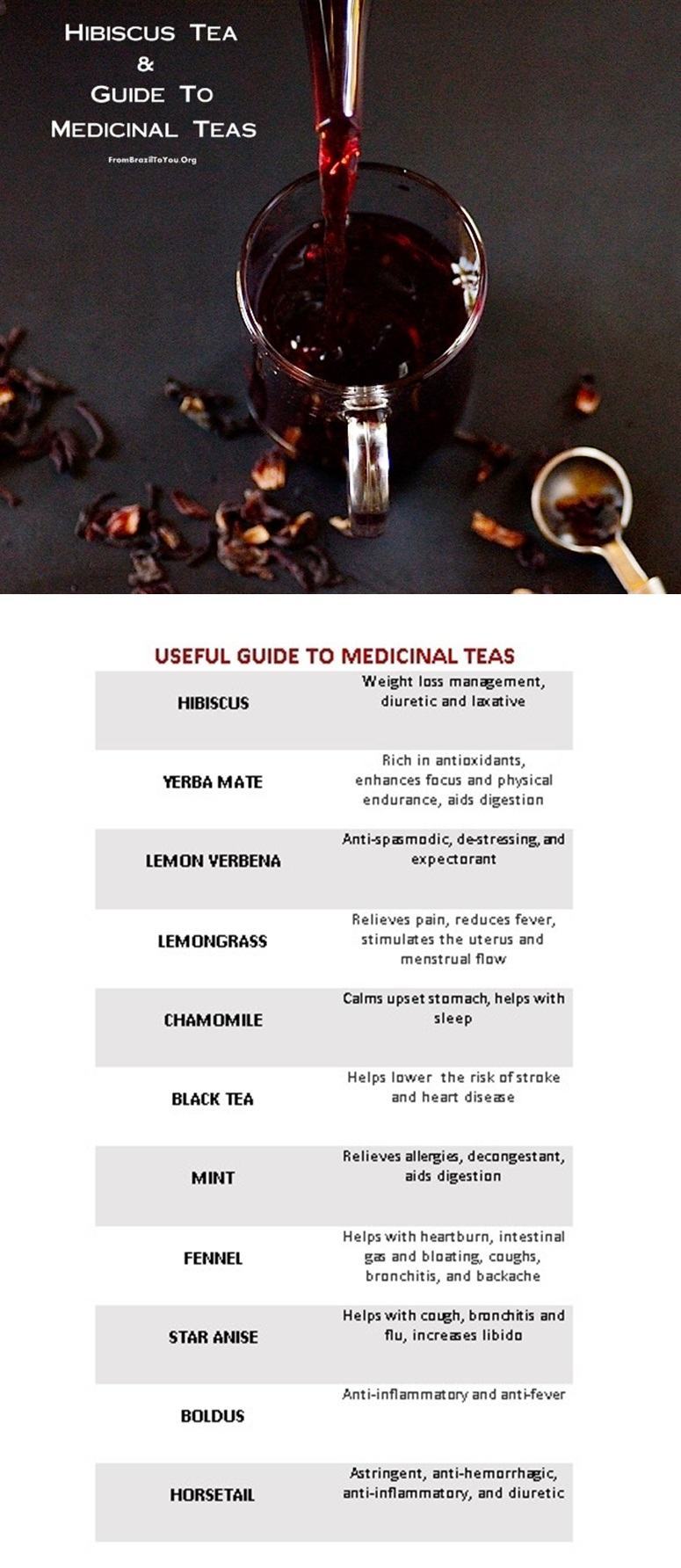
Easy Hibiscus Tea Recipe
Equipment
- 1 pot
Ingredients
- 6 cups water 48 ounces
- ⅓ cup dried hibiscus flowers
- 1 stick cinnamon
- Sugar honey, or sugar substitute to taste
- Lemon slices or lime or orange slices
Instructions
- Bring water to a boil (about 5-8 mins), turn off heat, and add the hibiscus flowers and cinnamon sticks. Cover and steep for about 15-20 minutes.
- Strain tea into desired container and stir in sugar or honey to taste. Serve warm with lime wedges on the side. This tea can be served chilled instead. For this, add ice and lemon slices (or orange or lime rounds).
- NOTE: Do not steep tea for a longer time because it can become bitter. If its flavor needs to be strengthened, add more herbs but do not steep tea longer.
Recipe Notes
Nutrition
** Nutrition labels on easyanddelish.com are for educational purposes only. This info is provided as a courtesy and is only an estimate, since the nutrition content of recipes can vary based on ingredient brand or source, portion sizes, recipe changes/variations, and other factors. We suggest making your own calculations using your preferred calculator, based on which ingredients you use, or consulting with a registered dietitian to determine nutritional values more precisely.
Please note that health-focused and diet information provided on easyanddelish.com is for educational purposes and does not constitute medical advice, nor is it intended to diagnose, treat, cure, or prevent disease. Consult with your doctor or other qualified health professional prior to initiating any significant change in your diet or exercise regimen, or for any other issue necessitating medical advice.



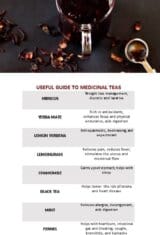
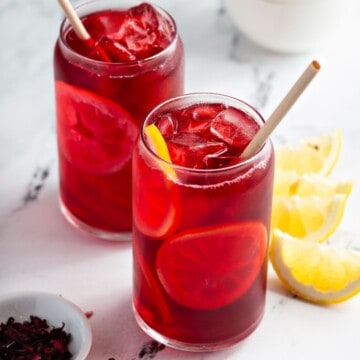
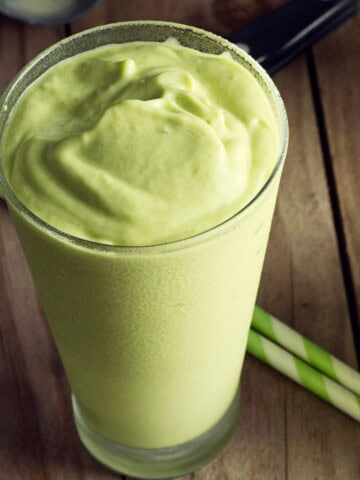
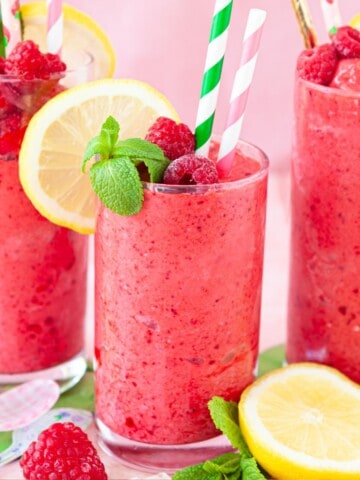
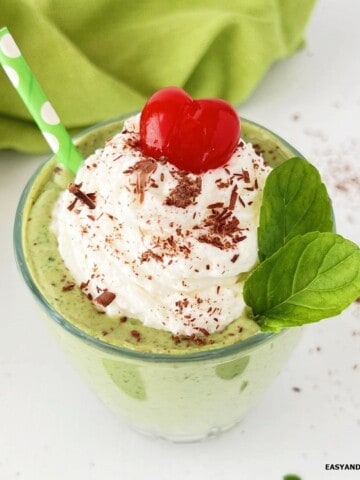
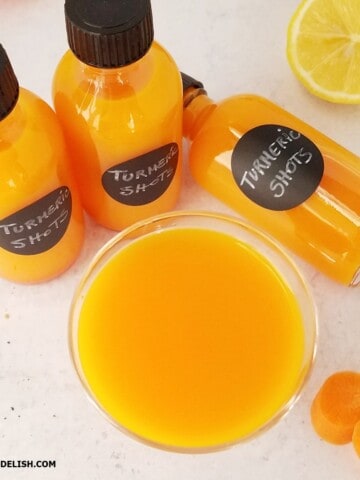
Dan says
Some good tips here. Drinking yerba mate chimarrão is a very healthy alternative to any sugary drink. It is packed full of antioxidants, vitamins & minerals.
When I am on the beach in Sao Paulo I always see people drinking the cold version. It is definitely a refreshing way to beat the heat.
Amira says
This post caught my eye .. Hibiscus tea is very popular in Egypt both cold and hot but we prepare it a little bit differently. Very informative post.
Little Cooking Tips says
Excellent idea Denise! We both love tea and similar hot medicinal beverages. We also use nettle, Origanum dictamnus (dittany), sideritis which are also very beneficial. And what's better than a hot cup of herbal tea during a cold, right?
We haven't tried Hibiscus tea, we'll look for those flowers in a store that specializes in herbs and it's close to our current place. Yes, we're still looking for a new place, but it's really hard, as there aren't as many place available as before due to the economic crisis. People are reluctant to move because of the moving costs, so less places are available. But we remain optimistic!:)
Really great job describing the health benefits of the several herbal tea varieties, it was such an informative post! Thank you!
Lots of hugs,
Panos and Mirella
Kate says
This is so interesting Denise! I'm giving away a hibiscus pairings box from Turntable Kitchen. You should head over to my site and check it out!
Anna @ shenANNAgans says
Oh, how cool. Looks like I need the lemon's & the horsetail in my diet. I kind of knew that herbal teas had their specific benefits, but I didn't know what exactly they were. Does peppermint have similar healing powers to mint?
Asha says
I enjoyed reading this post. Hibuscus is so healthy, I need to incorporate it into my tea.
Thanks for a informative post.
Deb|EastofEdenCooking says
Your post is so timely! This summer I've started drying herbs from my garden to use throughout the rest of the year. I just harvested mint and lemon verbena yesterday. As the months turn cold and wet I am looking forward to having a mug of steaming hot tea that is also healing and soothing.
Denise Browning says
Great for you, Deb! My family and I get sick every Fall -- either from seasonal allergies or colds. This year it started much earlier than the previous years.
Raymund says
Sounds perfect way to start for a cold day or even wind down to the night
Chris Scheuer says
Very informative and helpful post Denise - it's amazing how many natural remedies there are!